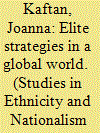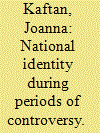| Srl | Item |
| 1 |
ID:
076754


|
|
|
|
|
| Publication |
2007.
|
| Summary/Abstract |
Poland provides a critical example for studying how national identity is transformed to fit new domestic and global circumstances. While Poles must re-identify themselves as a democratic nation, they have a choice of whether to incorporate aspects of the communist experience or to ignore it and draw solely from other historical sources. A comparison of holiday newspaper articles from before and after 1989 provides an opportunity to observe this process through the lens of national commemoration. This review shows that themes of national identity are influenced by political context and their potential to unify without contestation. In addition, while the communist period remained a salient unifying historical experience for Poles, democratic values did not act as a unifying theme during the first ten years of Polish democracy
|
|
|
|
|
|
|
|
|
|
|
|
|
|
|
|
| 2 |
ID:
109165


|
|
|
|
|
| Publication |
2011.
|
| Summary/Abstract |
This study focuses on how Polish elites view the relationship between Polish identity and Poland's place in the world. Samples of priests, politicians, and intellectuals were interviewed in 1999 and 2009. A typology of four ideal types is proposed: ideological nationals, pragmatic nationals, pragmatic transnationals, and ideological transnationals. This typology can be viewed as a continuum of elite emphasis ranging between national and transnational themes. This continuum of emphasis can be seen when examining elite responses to questions concerning NATO membership, EU membership, Polish identity, and Polish democracy. This study finds that while the majority of Polish priests and politicians wished to emphasise national over transnational themes, intellectuals stressed transnational themes. Nevertheless, most acknowledged the inseparable nature of these themes when they talked about the contemporary Polish nation.
|
|
|
|
|
|
|
|
|
|
|
|
|
|
|
|
| 3 |
ID:
120363


|
|
|
|
|
| Publication |
2013.
|
| Summary/Abstract |
Cinco de Mayo, celebrated by Mexican Americans as well as Americans of other ethnicities, provides an opportunity to examine the influence of ethnic festivals on broader US identity. Given the recent controversy over the immigration bill, State Bill 1070, passed in Arizona in 2010, the themes presented in newspaper articles concerning the celebration of the holiday in Phoenix, Arizona (2006-11) and the public response to these articles are examined. This examination reveals the intense contestation associated with the presentation of symbols and themes of national identity during periods of political controversy. It also illustrates that ordinary people have strong, long-standing opinions about the future of the nation and national identity and will express their opinions when an outlet is provided to them
|
|
|
|
|
|
|
|
|
|
|
|
|
|
|
|